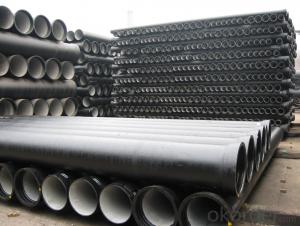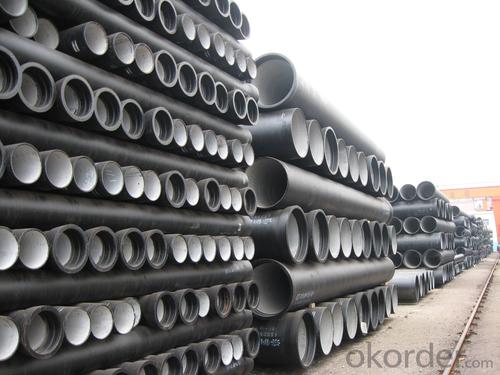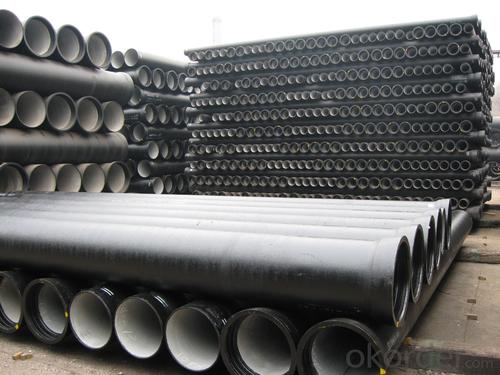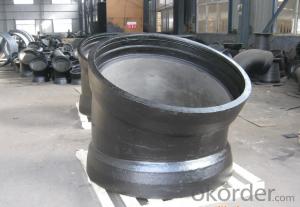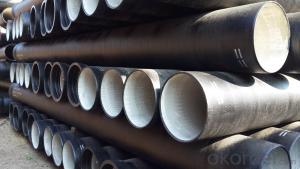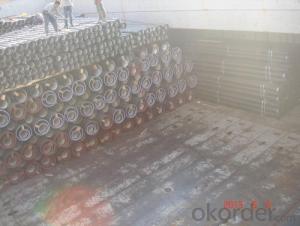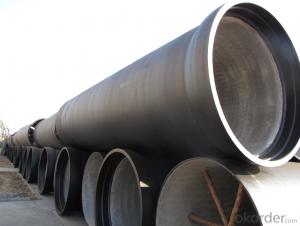Ductile Iron Pipe DN1200
OKorder Service Pledge
Quality Product, Order Online Tracking, Timely Delivery
OKorder Financial Service
Credit Rating, Credit Services, Credit Purchasing
You Might Also Like
Specifications
Quick Details
| Place of Origin: | China (Mainland) | Brand Name: | CMAX | Model Number: | T type / K type / Flange type |
| Length: | 6m / 5.7m / Negotiable | Standard: | ISO2531 / EN545 / EN598 | Application: | Potable / Sewage water |
| Diameter: | DN80~DN2200 | Shape: | Round | Hardness: | 230 |
| Pipe Wall Thickness: | standard | Pull Strength: | 420 | Yield (≥ MPa): | 300 |
| Material: | Ductile Iron | Type: | Centrifugal ductile cast iron pipe | Certification: | ISO2531 / EN545 / EN598 |
| Outer Diameter: | 80-2200 | Thickness: | standard | Specification: | DN80~DN2200 |
| |
The advantages to the customer:
Trustworthy financial strength.
One-stop shopping.
Fast and efficient service.
Coordination of shipments from multiple plants.
Specialists of the overseas shipping process.
A more competitive price.
- Q: What is the expected joint deflection capability of ductile iron pipes?
- Several factors can affect the expected joint deflection capability of ductile iron pipes. Generally, ductile iron pipes have a higher joint deflection capability compared to other pipe types. The joint deflection capability refers to how well a pipe joint can handle angular deflection or misalignment during installation or due to ground movement. Ductile iron pipes are known for their flexibility, which allows them to withstand external forces and movements without compromising their structural integrity. The expected joint deflection capability of ductile iron pipes typically falls within a range of 1 to 5 degrees, depending on the pipe diameter and wall thickness. This means that the pipes can safely accommodate angular deflection within this range without experiencing leaks or failures. It's important to consider that the joint deflection capability can also be influenced by factors like the type and quality of the joint restraint system, soil conditions, installation techniques, and pipe alignment. To ensure optimal joint deflection capability, it is crucial to follow proper installation practices and adhere to the guidelines provided by the manufacturer. All in all, ductile iron pipes have been designed and manufactured with a significant joint deflection capability, making them suitable for a wide variety of applications, including water distribution, sewer systems, and industrial piping networks.
- Q: What is the relationship between the installation direction of the ductile iron pipe and the direction of flow?
- Suppose the water flows from east to west, then the pipe mouth is in the East socket at the West
- Q: What quota can be used for the installation of DN300 ductile iron pipes?
- Ductile iron is a kind of high strength cast iron material developed in 50s twentieth Century, its comprehensive performance is close to the steel, it is based on its excellent performance, has been successfully used in casting complex stress, strength, toughness and wear resistance requirements of the higher parts. Nodular cast iron has developed rapidly to be second only to grey cast iron and widely used as cast iron material. The so-called "iron instead of steel", mainly refers to ductile iron.
- Q: How do ductile iron pipes handle heavy traffic loads?
- Ductile iron pipes are known for their exceptional strength and durability, making them well-suited to handle heavy traffic loads. Their high tensile strength and resistance to cracking or breaking under pressure allow them to withstand the weight and stress generated by heavy traffic. Additionally, the flexible nature of ductile iron allows it to absorb and distribute the load, reducing the risk of damage or failure. Overall, ductile iron pipes are a reliable choice for handling heavy traffic loads in various infrastructure systems.
- Q: What effect does magnesium play in nodular cast iron?
- Magnesium can be graphite precipitated in spherical form.But the specific mechanism is not clear, and now it is still debated in the academic circles.In addition, magnesium and sulfur generate MgS, which removes S from molten iron, which impedes the formation of spheroidal graphite.Therefore, Mg has two functions to eliminate the influence of S on Nodular Iron and promote the precipitation of graphite in spherical form.
- Q: Are ductile iron pipes resistant to corrosion?
- Yes, ductile iron pipes are highly resistant to corrosion.
- Q: Will nodular cast iron pipes rust?
- Although the wall has a long flow of water, but oxygen scarce, compared with the outer wall is not easy to corrosion, but there is cement lining is necessary.
- Q: How can the ductile iron pipe be tested?
- In the hydraulic test, the ductile iron pipe can not be close to the back, support, pipe end and so on. The inspection must be carried out after all stops
- Q: Advantages and disadvantages of ductile iron pipes
- Generally not used in high pressure pipe network (6MPa or more). Because the pipe is relatively bulky, the machine must be used when installing. When the water leak occurs after the test, all the pipes must be dug out, and the pipe can be hoisted to the height of the clamps. The clamps can be installed to prevent leakage.
- Q: Can ductile iron pipes be used for firefighting systems?
- Yes, ductile iron pipes can be used for firefighting systems. Ductile iron is a strong and durable material that can withstand high pressures and extreme temperatures, making it suitable for transporting water in firefighting systems. Its ability to resist corrosion and withstand external loads also ensures the long-term reliability and performance of the pipes. Additionally, ductile iron pipes have excellent fire resistance properties, as they do not burn, emit toxic fumes, or contribute to the spread of fire. Therefore, ductile iron pipes are a reliable and commonly used choice for firefighting systems due to their strength, durability, and fire resistance.
Send your message to us
Ductile Iron Pipe DN1200
OKorder Service Pledge
Quality Product, Order Online Tracking, Timely Delivery
OKorder Financial Service
Credit Rating, Credit Services, Credit Purchasing
Similar products
Hot products
Hot Searches
Related keywords



